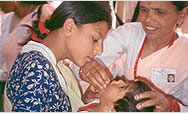Newborn Health and Survival
The first days and weeks of life
are critical for the future health and survival of
a child. Nearly two-thirds of the of 6.5 million
infant deaths each year occur within the first four
weeks
of life, and about two-thirds of those occur
within the first week. Tragically, 98 percent of
these deaths occur in developing countries. The immediate
causes of newborn death include infection, birth
asphyxia, complications related to premature birth,
and congenital anomalies. Low birthweight, poor maternal
nutrition, maternal reproductive tract infections,
and a family’s access to health services are contributing
factors to newborn death.
Newborn and maternal health and
survival are closely linked, therefore, it is important
to treat mothers and their child as a diad through
all phases of pregnancy and delivery. Healthy mothers
who have access to proper nutrition and health care
throughout the continuum of pregnancy and postpartum
care are less likely to suffer from ill health or
death, and their babies face a lower risk of disease
and premature death. But keeping a newborn alive
and well requires more than proper care for mothers.
Newborns themselves require special attention separate
from that of their mothers to assure a healthy start
to life.
An essential newborn care package
consists of both basic and special health care services
provided to mothers and newborns during antenatal
care, labor and delivery, and postpartum. Trained
health providers, behavior change communication techniques
and community mobilization activities are key conduits
for providing basic care. Specialized care for newborns
and mothers with specific needs often require advanced
levels of care.
Antenatal
Labor and Delivery Care
Postpartum Care
Antenatal Care
Basic Care for All Newborns: During her pregnancy, a mother
should receive preventive health care interventions such as tetanus toxoid
immunizations; iron and folate supplements, and where necessary, iodine supplements;
malaria prophylaxis where necessary, and syphilis screening and treatment.
In addition, mothers require education and counseling on HIV/AIDS/STI prevention
during and after pregnancy, breastfeeding, birth preparedness, and prevention
of mother-to-child transmission (PMTCT) of HIV/AIDS in endemic areas. Nutrition
education and access to an adequate diet during pregnancy are also essential
for both mother and newborn.
Special Care for Sick Newborns: When maternal or fetal complications
occur during pregnancy, special services may be required. For example, HIV-positive
mothers require PMTCT counseling and appropriate interventions. Other obstetric
and neonatal complications may also require individual management or referrals
to expert care services.
Labor and Delivery Care
Basic Care for All Newborns: Skilled attendance during labor
and delivery plays a key role in basic newborn care. Essential services include
a clean delivery, prevention of hypothermia, immediate breastfeeding (with
special counseling for HIV-positive mothers), preventive eye care, and PMTCT
interventions.
Special Care for Sick Newborns: Birth asphyxia and injuries,
low birth weight, and complications of prematurity require additional care.
Those attending the birth should be trained in resuscitation, newborn warming,
hygiene, and assisted feeding techniques and care. Providers should also be
aware and prepared to refer mother and newborn to higher level health care.
Postpartum Care
Basic Care for All Newborns: Care for mothers and newborns
does not stop after delivery. Postpartum care and follow-up are essential
for the health of the mother and her child. Basic care include exclusive breastfeeding,
warmth for the newborn, hygienic cord care, immunizations, maternal nutrition
and counseling, birth spacing services and information, and PMTCT interventions
as necessary.
Special Care for Sick Newborns: Maternal and newborn postpartum
infection, congenital anomalies, and other health problems should be addressed
promptly. Postpartum care services should include antibiotics, supportive
care, ARV therapy where available for HIV-positive mothers, PMTCT follow-up
care for newborns born to HIV-positive mothers, and referral to more advanced
health care services.
|


